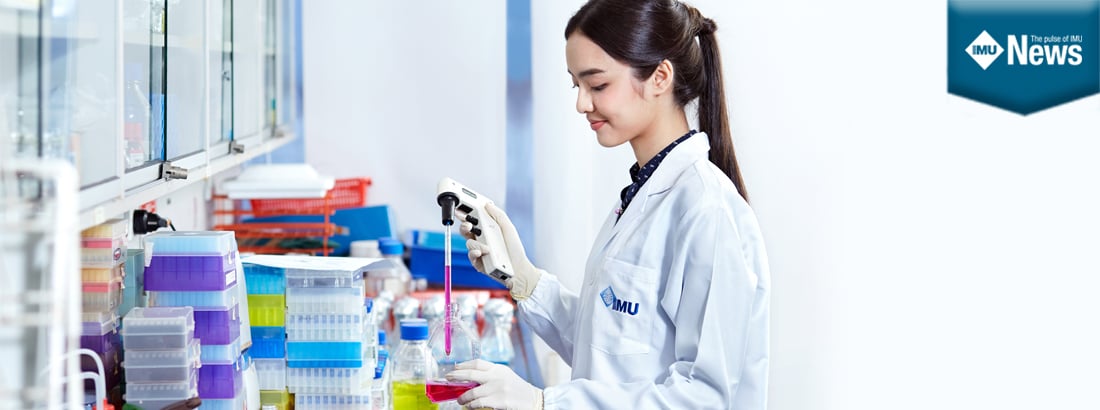For the past century, animal-based research has played a vital role in the advancement of scientific and medical knowledge especially in the understanding of various diseases. Studies on animals have provided basic information on animal biology and physiology, which may be extrapolated to human biology. This knowledge subsequently translated into the development of new medicines and treatments, which in turn improve the quality of human life. For any animal-based research, the first step to note is always on how to handle and maintain experimental animals. Proper animal handling and experimental techniques within an ethical framework can minimise the pain and distress of experimental animals.  In view of the importance of animal handling skills, the IMU Medical Biotechnology programme organised a one-day workshop on basic animal handling techniques for MB117, MB118 and MB119 students at the International Medical University on 11 March 2020. This workshop was aimed at providing students with a basic knowledge and technical skills on laboratory animal handling and maintenance, including the understanding of the ethics and regulations for the use of animals in research.
In view of the importance of animal handling skills, the IMU Medical Biotechnology programme organised a one-day workshop on basic animal handling techniques for MB117, MB118 and MB119 students at the International Medical University on 11 March 2020. This workshop was aimed at providing students with a basic knowledge and technical skills on laboratory animal handling and maintenance, including the understanding of the ethics and regulations for the use of animals in research.  The workshop began with an introductory lecture on experimental animal handling and maintenance in research, and animal ethics. After the lecture, students were given a hands-on opportunity on animal restraining, labelling, blood collection, and dissection using mouse and rat animal models. The hands-on sessions were facilitated by IMU academic staff (Dr Kok Yih Yih, Dr Tan Boon Keat, Dr Chan Kok Keong, Dr Wong Siew Tung and Dr Premdass Ramdas) who has years of experience in animal-based research. Most students were confident when performing animal restraining, tail bleeding and cardiac puncture technique, while a few of them managed to conquer their initial fear at handling mice or rats towards the end of the session. The students also learnt that they should be calm and gentle while attempting to restrain the animal, because sudden and jerky moves would provoke the animal and turned them aggressive. The workshop ended with a feedback session, where all the participants expressed their excitement and hope to have another workshop on advanced techniques in the upcoming years.
The workshop began with an introductory lecture on experimental animal handling and maintenance in research, and animal ethics. After the lecture, students were given a hands-on opportunity on animal restraining, labelling, blood collection, and dissection using mouse and rat animal models. The hands-on sessions were facilitated by IMU academic staff (Dr Kok Yih Yih, Dr Tan Boon Keat, Dr Chan Kok Keong, Dr Wong Siew Tung and Dr Premdass Ramdas) who has years of experience in animal-based research. Most students were confident when performing animal restraining, tail bleeding and cardiac puncture technique, while a few of them managed to conquer their initial fear at handling mice or rats towards the end of the session. The students also learnt that they should be calm and gentle while attempting to restrain the animal, because sudden and jerky moves would provoke the animal and turned them aggressive. The workshop ended with a feedback session, where all the participants expressed their excitement and hope to have another workshop on advanced techniques in the upcoming years.
| What Students Say about the Workshop |
|---|
| “This workshop was a new experience for me. I have learnt restraining, animal labelling, performing tail bleed, cardiac puncture and dissection on rat. Demonstration and clear explanations were given for every part, so I could understand and learn the purpose and importance of the steps in handling animal.” Ng Kar Hou, MB117 |
| “In this workshop, I have learnt the technique of handling laboratory animals ethically and professionally. This is a very useful skill for medical biotechnologists in the research field. I also appreciated how animals have sacrificed their lives for the advancement in medical research.” Chow Shiu Sheng, MB118 |
| “I have mastered several vital skills that are essential for Medical Biotechnology from this workshop. Other than that, through the proper handling of these animals, I have learnt to cherish and appreciate all the animals around me.” Loong Ka Hui, MB119 |
Article prepared by Tan Boon Hooi, Loong Kah Hui, Chow Shiu Sheng, Ng Kar Hou Photos taken by Tan Boon Hooi









